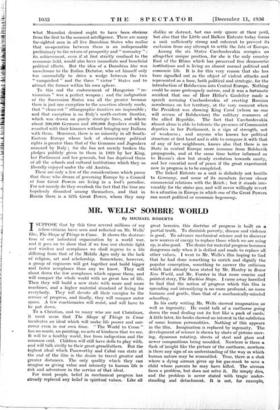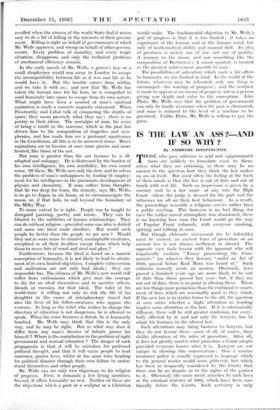MR. WELLS' SOMBRE WORLD
By MICHAEL ROBERTS
ISUPPOSE that by this time several millions of my fellow-citizens have seen and reflected on Mr. iVelts' film, The Shape of Things to Come. It shows the destruc- tion of our industrial organisation by a world war, and it goes on to show that if we lose our electric light and wireless and aeroplanes we shall regress to a life differing from that of the Middle Ages only in the lack of religion, art and scholarship. Somewhere, however, a group of engineers will get together and build bigger and faster aeroplanes than any we know. They will shoot down the few aeroplanes which oppose them, and . will conquer the whole world with no great loss of life. Then they will build a new state with more and more machines, and a higher material standard of living for everybody. They will devote all their energies to the service of progress, and finally, they will conquer outer space. A few reactionaries will resist, and will have to be put down.
To a Christian, and to many who are not Christians, it must seem that The Shape of Things to Come inculcates an ideal which will make life poorer and nar- rower even in our own time. "The World to Come" has no music, no painting, no acts of kindness that we see. It will be a healthy world, free from indigestion and the common cold. Children will still have dolls to play with, and will talk civilly to their great-grandfathers. But the highest ideal which Passworthy and Cabal can state at the end of the film is the desire to travel greater and greater distances. The only quality which they can imagine as giving value and intensity to human life is risk and adventure in the service of that ideal.
For most people, belief in mechanical progress has already replaced any belief in spiritual values.- Like all great heresies, this doctrine of progress is built on a partial truth. To diminish poverty, disease and violence is good. To advance mechanical science and to discover new sources of energy to replace those which we are using up, is also good. The desire for material progress becomes dangerous only when it is deified and made to replace all other values. I went to Mr. Wells's film hoping to find that he had done something to enrich and dignify the popular conception, something to answer the .criticism which had already been stated by Mr. Huxley in Brave New World, and Mr. Forster in that more concise and pointed story, The Machine Stops. I came away. horrified to find that the notion of progress which this film is spreading and intensifying is no more profound, no more humane and gentle, than that of a mechanically-minded schoolboy.
In his early writing Mr. Wells showed imagination as well as ingenuity. He could talk of a carthorse going down the road dealing out its feet like • a pack of cards: A little later, his books showed an interest in the subtleties of some human personalities. Nothing of this appears in the film. Imagination is replaced by ingenuity. The development of science is shown by shots of pistons mov- ing, dynamos rotating, sheets of steel and glass and newer compositions being moulded. Nowhere is there a flash of insight like the picture of the carthorse, nowhere is there any sign of an understandinff" of the way in which human nature may be remoulded. True, there is a shot where a dying airman gives up his gas-mask to save a child whose parents he may have killed. The airman faces a problem, but does not solve it. He simply dies, and the problem is never stated with tragic under- standing and detachment. It is not, for example, recalled when the airmen of the world State find it neces- sary to do a bit of killing in the interests of their govern- ment. Killing is right on behalf of governments of which Mr. Wells approves, and wrong on behalf of other govern- ments. Every problem of morality, and every tragic situation, disappears, and only the technical problems of mechanical efficiency remain.
In the early novels of Mr. Wells, a grocer's boy or a small shopkeeper would run away to London to escape the incompatibility between life as it was and life as he would have it. But the trouble comes from within, and we take it with us ; and now that Mr. Wells has taken the human race for his hero, he is compelled to send humanity into space to escape from its own nature. What might have been a symbol of man's spiritual aspiration is made a concrete unpoetic statement. When Passworthy and Cabal talk of conquering the depths of space, they mean precisely what they say : there is no poetry in their idiom. The nostalgia of man, his sense of being a misfit in the universe, which in the past has driven him to the composition of tragedies and sym- phonies, and has made him see a profound significance in the Crucifixion, all this is to be narrowed down. Man's aspirations are to become at once more precise and more limited, like those of the ant.
. But 'man is greater than the ant because he is ill- adapted and unhappy. He is distressed by the burden of his own intelligence, his own sensibility, his own moral sense. Of these, Mr. Wells sees only the first, and he solves the problem of man's unhappiness by finding fit employ- ment for his intelligence in the passionate development of physics and chemistry. If man suffers from thoughts that lie' too deep for tears, the remedy, says Mr. Wells, is to go to Japan in six hours, or to circumnavigate the moon, or, if that fails, to sail beyond the boundary of the Milky Way.
To some extent he is right. People can be taught to disregard painting, poetry and music. They can be blinded to the subtleties of human relationships. They can do without religion—provided some one idea is deified and some one ideal made absolute. But would such people be better than the people we are now ? Would they not in some sense be stunted, unadaptable creatures, atrophied in all their faculties except those which help them to move bits of wood and steel and glass ?
Furthermore, because the ideal is based on a narrow conception of humanity, it is not likely to lead to attain- ment of its own limited objectives. Complete extraversion and unification are not only bad ideals ; they arc impossible too. The citizens of Mr. Wells's new world still suffer from enthusiasms which give men the courage to die for an ideal themselves and to sacrifice others, friends or enemies, for that ideal. The ruler of his world-state is willing not only to risk the life of his daughter in the cause of interplanetary travel but also the lives of his fellow-creatures who oppose the venture. As long as the rebel who wishes to change the direction of education is not dangerous, he is allowed to speak. When his voice becomes a threat, he is humanely bombed. Mr. Wells may think that this is the only way, and he may be right. But in what way does it differ from any man's dreams of infinite power for himself ? Where is the contribution to the problem of right government and mutual toleration ? The danger of such propaganda is that it will be mistaken for profound political thought, and that it will cause people to lead narrower, poorer lives, whilst at the same time heading for political disaster through their own failure to under- stand themselves and other people. .
Mr. Wells can see only two objections to his religion of progress. First, it demands a few living sacrifices. Second, it offers humanity no rest. Neither of these are the objection which a poet or a sculptor or a Christian would make. The fundamental objection. to Mr. Wells's god of progress is that it is too limited ; it takes no cognisance of the human soul or the human mind, but only of mathematical ability and manual skill. Its idea of greatness is merely one of size, not one of quality. 'A journey to the moon, and not something like the composition of Beethoven's A minor quartet, is treated as the greatest achievement possible to man.
The possibilities of adventure which such a life offers to humanity are too limited in kind. In the world of the future, whatever may be tolerated, only one thing is encouraged—the worship of progress ; and the sculptor is made to appear as an enemy of progress, not as a person giving new depth and value to the conception. Like Plato, Mr. Wells sees that the problem of government can only be finally overcome when the poet is eliminated, and man is reduced to the level of a machine to be governed. Unlike Plato, Mr. Wells is willing to pay the price.

















































 Previous page
Previous page